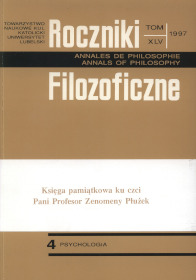Psychological Determinants of Efficient Educational Influence Studies on Pedagogy Students
Abstract
The paper is focused on the personality determinants of an efficient educational influence. It presents empirical researches designed to verify the following two hypotheses:
1) the relationship between general social maturity of an individual with the effectiveness of educational actions, and 2) to what extent the conditions of a helpful contact are found useful in educational interaction.
The subjects consisted of pedagogy students. 144 subjects were tested by the technique of paired-comparisons method. Thus two groups were selected, each of which contained 30 subjects: A – with high, B – with low, predispositions for an efficient educational influence. These groups were then tested by Gough's CPI questionnaire and KBE scale (constructed by the author and designed to measure the level of congruence, unconditionally positive attitude and empathy). The findings confirmed the initial hypotheses. The high predispositions for an effective educational influence is combined with high scores (more than 5.5 sten) in 11 scales CPI (Do, Cs, Sp, Sa To, Cm, Ai, Ie, Py, Fx, and Te). The strongest correlations occurred between the sense of own value and congruence (pu < 0.01), tolerance and empathy (pu < 0.01); mental efficiency and “positive attitude” (pu < 0.01); and also between the attribute of femininity and empathy (pu < 0.01). The studies allow us to draw a conclusion that at the basis of an effective educational influence there lies a general social maturity of the educator and whether he conforms to the psychological conditions of a helpful contact.
References
Arnekker E. (1955). O kontrolowanej obserwacji porównawczej. Przegląd Socjologiczny, 4, 485-534.
Baley S. (1958). Psychologia wychowawcza w zarysie. Warszawa: PWN.
Carkhuff R. R. (1980). The art of helping IV. Amherst. AM: Human Resource Development Press.
Dobrowolski S. (1957). Dobór młodzieży do zawodu nauczycielskiego. Warszawa: PZWS.
Dobrowolski S. (1979). Struktury umysłów nauczycieli. Warszawa: WSiP.
Gough H. G. (1957). Psychological Inventory-Manual. Palo Alto.
Guilford J. P. (1964). Podstawowe metody statystyczne w psychologii i pedagogice. Warszawa: PWN.
Gurycka A. (1964). Ocena skuteczności oddziaływań wychowawczych: istotny problem psychologicznych podstaw wychowania. Psychologia Wychowawcza, 1, 3-20.
Gurycka A. (1979). Struktura i dynamika procesu wychowawczego. Warszawa: PWN.
Grzesiuk L. (1978). Spotkania, które leczą. Warszawa: Nasza Księgarnia.
Jeziorska J. (1995). Warunki efektywnego nauczania i uczenia się w szkole. W: K. Franczak, J. Niewęgłowski (red.), Wychowanie wobec zachodzących przemian. Warszawa: Salezjański Instytut Wychowania Chrześcijańskiego.
Jędrzejczak M. (1980). Osobowość doradcy a cele i zadania poradnictwa wychowawczego. Acta Universitatis Wratislaviensis, 608, 37-70.
Kępiński A. (1974). Melancholia. Warszawa: PZWL.
Kotarbiński T. (1965). Traktat o dobrej robocie. Wrocław: Ossolineum.
Kozielecki J. (1985). Psychologiczna teoria samowiedzy. Warszawa: PWN.
Kunowski S. (1993). Podstawy współczesnej pedagogiki. Warszawa: Wyd. Salezjańskie.
Łapiński E. (1980). Psychologiczne determinanty działalności zawodowej nauczycieli. Olsztyn: WSP.
Markowska B., Kottas A. (1968). Inwentarz Psychologiczny H. G. Gougha. Opracowanie monograficzne. Warszawa: Pracownia Psychometryczna PAN.
Miller R. (1981). Socjalizacja. Wychowanie. Psychoterapia. Warszawa: PZWS.
Nowak S. (1965). Metody badań socjologicznych. Warszawa: PWN.
Polakowski K. (1976). Psychologiczne determinanty powodzenia w studiach nauczycielskich. Warszawa: PZWS.
Polakowski K. (1979). Struktura osobowości jako predyktor przystosowania i osiągnięć w studiach (na podstawie badań studentów WSPS inwentarzem CPI H. G. Gougha). Warsza¬wa: PZWS.
Pomianowski R. (1989). Interakcje międzyosobowe a wychowanie i rozwój człowieka. W: Z. Chlewiński (red.), Wybrane zagadnienia z psychologii pastoralnej. Lublin: RW KUL, s. 42-67.
Przetacznikowa-Gierowska M., Włodarski Z. (1994). Psychologia wychowawcza. Warszawa: PWN.
Rogers C. (1957). The necessary and sufficient conditions of psychoterapeutic personelity change. Journal Counsult. Psychology, 21, 85-103.
Rogers C. (1991). Terapia nastawiona na klienta. Tłum. [z jęz. ang.] A. Dodziuk, E. Knoll. Wrocław: Thesaurus-Press.
Smith D. M. (1978). Educational psychology and its classroom applications. Boston.
Stefanović J. (1976). Psychologia wzajemnych kontaktów nauczycieli i uczniów. Tłum. [z. jęz. słowac.] A. Dierżanka-Wyszyńska. Warszawa: WSiP.
Sujak E. (1982). Życie jako zadanie. Warszawa: Pax.
Taylor H. (1971). School counselling. London.
Copyright (c) 1997 Roczniki Filozoficzne

This work is licensed under a Creative Commons Attribution-NonCommercial-NoDerivatives 4.0 International License.





